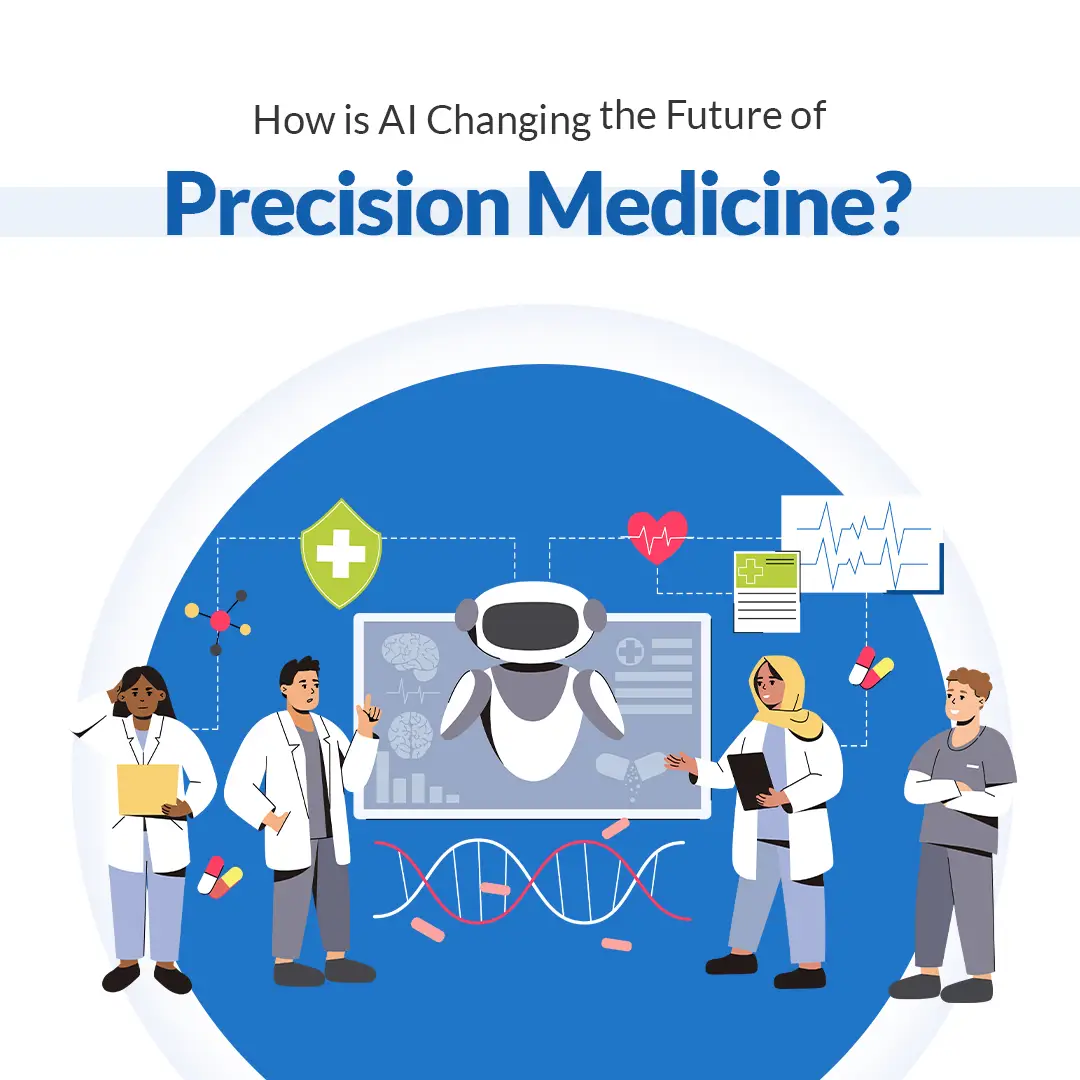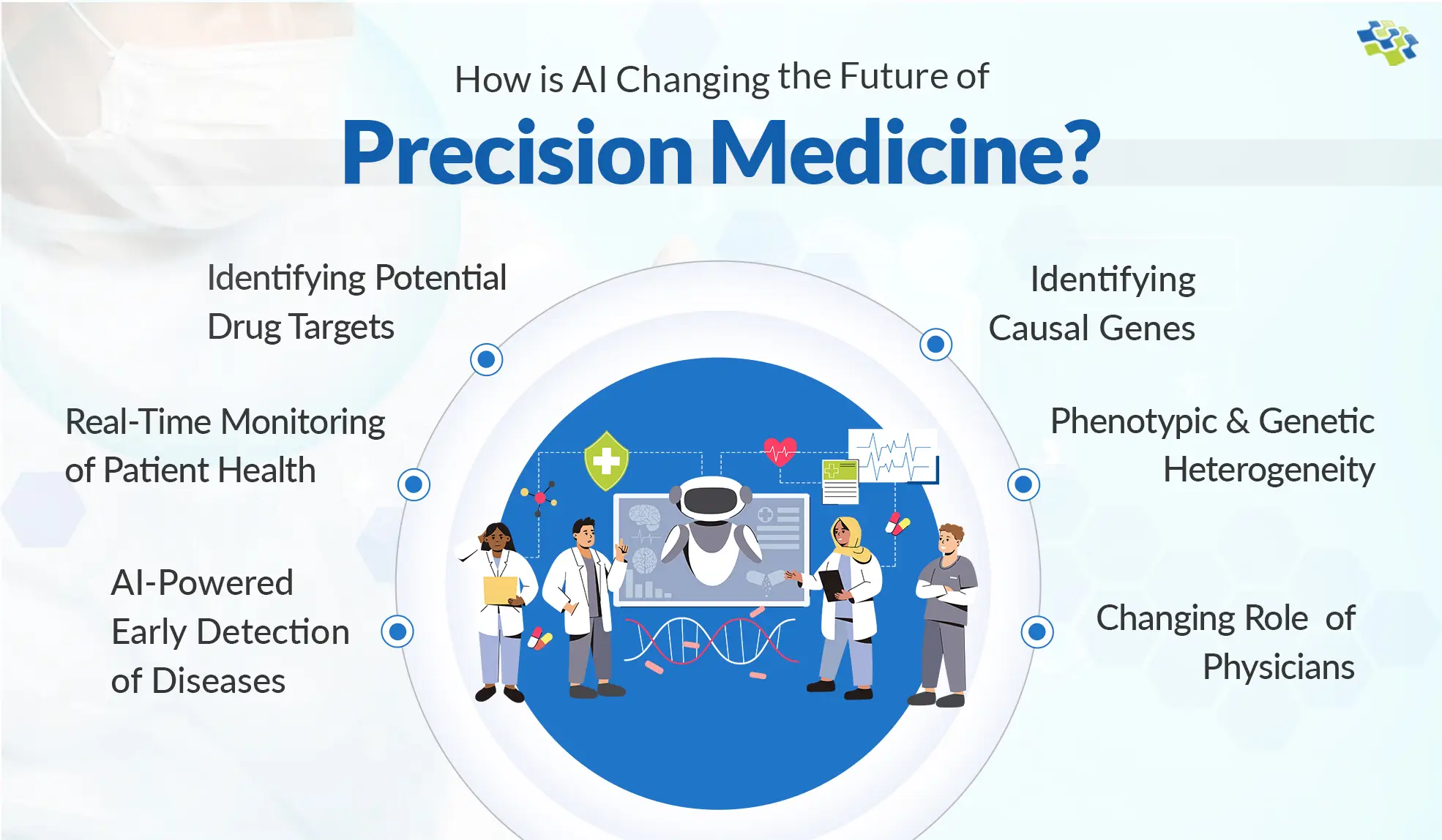How is AI Changing the Future of Precision Medicine?
It enables society to fully embrace the potential of this cultural shift, guiding healthcare into a future where precision medicine is the cornerstone, fostering a patient-focused, data-driven, and personalized era of healthcare.

“Between 2019 and 2028, U.S. healthcare spending is expected to rise annually by 5.4%, reaching $6.2 trillion. Projections indicate healthcare’s share of the U.S. economy will increase from 17.7% in 2018 to 19.7% in 2028, underscoring significant economic impact.”– Forbes
Why Precision Medicine?
Precision medicine refers to an approach for preventing and treating diseases that takes into account individual variability in genes, environment, and lifestyle for everyone. Unlike traditional one-size-fits-all methods, it hones treatments to each person’s unique biological makeup. Although the concept isn’t new, its integration into routine healthcare is expanding. Presently, only 29% of healthcare institutions employ precision medicine widely. However, experts predict a substantial increase in its application across various medical sectors. This tailored approach promises more effective treatment and prevention strategies, reduction in adverse effects and development of new treatments. By targeting treatments more precisely, precision medicine can help allocate healthcare resources more efficiently and reduce unnecessary costs associated with ineffective treatments or trial-and-error approaches.
Critical Steps to Develop & Deliver Precision Medicine
In our podcast, “Developing & Delivering Innovative Treatments in Precision Medicine,” industry leaders Mr. Deepak Mittal (CEO, NextGen Invent) and Ms. Barri Blauvelt (CEO, Innovara) discuss vital aspects of precision medicine development. They explore crucial strategies, emphasizing the need for robust intellectual property protection and precise clinical trial design. The conversation underscores the pivotal role of disruptive technologies like AI and biotechnology. Their insights shed light on the dynamic landscape of precision medicine, offering listeners essential guidance to pioneer innovative treatments in this transformative field.
- Comprehensive Intellectual Property Protection: One of the foremost technical steps in developing precision medicines is ensuring comprehensive intellectual property (IP) protection. Companies must conduct thorough IP due diligence, both domestically and internationally. This involves not only filing patents in key markets like Japan and the USA but also safeguarding the technology globally. Neglecting any part of the world leaves innovation vulnerable to reverse engineering and potential patent infringements. To secure their position, companies should proactively protect their know-how, formulations, and methodologies, making their IP strategies bulletproof. This step is vital to prevent competitors from replicating the technology and gaining an edge in the market.
- Rigorous Clinical Trial Design & Execution: Precision medicines, especially gene therapies, often involve specialized treatments targeted at specific patient populations. Designing and executing clinical trials with precision is crucial. Unlike broader healthcare fields, precision medicine trials might have smaller sample sizes, focusing on specific genetic markers or rare diseases. Therefore, meticulous planning is essential to identify suitable participants, establish robust endpoints, and ensure statistically significant results. Additionally, employing advanced techniques like adaptive trial designs, biomarker-driven studies, and real-world evidence integration can enhance the efficiency and accuracy of clinical trials. Properly conducted trials are fundamental in demonstrating the efficacy and safety of precision medicines, paving the way for regulatory approval and widespread adoption.
- Strategic Financial Management & Funding Allocation: Precision medicine development demands strategic financial management, especially in startups and smaller companies. Due to the specialized nature of these therapies, research and development costs can be significant, even with smaller patient cohorts. Strategic planning of funding rounds is essential to secure adequate capital without overinflating valuations prematurely. Companies need to carefully assess their financial needs across different stages of development, from initial research to post-launch activities. Effective allocation of funds, focusing on essential research components, technology optimization, and regulatory compliance, is vital. Moreover, maintaining financial flexibility is crucial to adapt to unexpected challenges and capitalize on emerging opportunities, ensuring the continuous advancement of precision medicine projects.
By focusing on these technical steps, pharmaceutical and biotechnology companies can navigate the complexities of developing and delivering precision medicines, ensuring their innovations are not only scientifically groundbreaking but also commercially viable and globally protected.
Further Read: 6 Proven Patient Engagement Strategies
Role of AI in Changing the Future of Precision Medicine?
AI has been a longstanding asset in healthcare, offering immense potential for both medical advancements and research. AI’s integration into precision medicine holds the promise of revolutionizing healthcare by providing more precise, data-driven, and personalized approaches to disease prevention, diagnosis, and treatment.
 1. AI-Powered Diagnosis of Disease
1. AI-Powered Diagnosis of Disease
In precision medicine, artificial intelligence has significantly enhanced disease diagnosis, resulting in higher accuracy, efficiency, and effectiveness. By employing complex algorithms and advanced data processing, AI equips medical professionals to identify patients swiftly and accurately, leading to improved outcomes. AI processes vast medical data, including patient records and genetic profiles, detecting subtle correlations that might elude human observation. Notably, in dermatology, AI achieved a remarkable 95% accuracy rate, outperforming human dermatologists at 86.6%, based on a dataset of 130,000 images. AI’s prowess extends to predicting diseases and identifying risk factors. For instance, a Stanford University AI program predicted Alzheimer’s onset years before symptoms, boasting an 82% accuracy rate. Analyzing brain images and patient data, AI excels in recognizing intricate connections. This transformative technology empowers medical professionals, significantly elevating the accuracy and efficiency of disease diagnosis and prognosis.
2. Real-Time Monitoring of Patient Health
Leveraging AI algorithms, healthcare systems analyze real-time data from wearables, IoT sensors, and health monitors. These systems monitor vital signs, detect anomalies, and offer invaluable insights to healthcare practitioners. AI-powered systems reduce diagnostic errors by up to 30%, significantly improving patient care. For instance, AI-powered monitoring can detect cardiac issues by analyzing heart rate variability and blood pressure, enabling early intervention. Remarkably, AI’s analysis extends beyond physiological data, encompassing genomic data, patient-reported outcomes, and electronic health records. This comprehensive approach equips healthcare providers with deep insights, facilitating individualized interventions. Prompted by AI alerts, healthcare practitioners can initiate timely treatments, potentially saving lives. This multifaceted integration of AI not only enhances patient outcomes but also revolutionizes healthcare decision-making, ensuring tailored, efficient, and life-saving interventions.
3. Identifying Potential Drug Targets
AI significantly contributes to identifying therapeutic targets crucial in disease pathways. AI systems analyze extensive biological and genetic data, unveiling new targets for interventions. Notably, in cancer research, AI, in collaboration with the Cancer Genome Atlas (TCGA), scrutinized data from thousands of patients. This partnership identified specific genetic abnormalities, leading to unique therapeutic targets for precision medicines, such as mutations or overexpressed proteins. These findings enable the development of highly specialized medicines tailored to individual patients. Remarkably, AI-driven strategies have accelerated this process, enhancing the precision and effectiveness of treatments. This symbiosis between AI and medical research not only revolutionizes personalized medicine but also underscores the potential for tailored therapies, ensuring better patient outcomes.
4. Identifying Causal Genes
AI methods are pivotal in pinpointing causative genes and loci, even amidst the challenge of classifying prevalent missense mutations accurately. Bioinformatics struggles to differentiate harmful mutations from “Variations of Uncertain Significance” (VUS). However, AI solutions offer promise. Recent breakthroughs showcase AI’s power in enhancing genetic diagnosis of neurodevelopmental disorders (NDDs). Notably, the Human Splicing Code and DeepSEA algorithms have displayed remarkable accuracy in classifying missense variations. These advancements are significant; they represent an 85% improvement in accuracy, highlighting AI’s potential in transforming genetic disorder diagnosis and personalized treatment strategies. These developments signify a crucial step forward in understanding and addressing complex genetic variations, heralding a new era in genomics research and precision medicine.
5. Phenotypic & Genetic Heterogeneity
Neurodevelopmental disorders (NDDs) are primarily hereditary, but environmental factors influence disease severity by shaping genetically determined brain patterns. Postzygotic mosaic mutations, identified in various studies, link to NDDs like intellectual impairment, epilepsy, and autism spectrum disorders. Healthcare data has surged due to digitized medical records. Digitization initiatives, enabling genotype-phenotype relationships, offer vast potential. They allow AI algorithms to correlate genetic data with diverse traits, significantly aiding disease analysis. Understanding these correlations enhances diagnosis accuracy and treatment strategies, marking a pivotal leap in NDD research. Environmental influences on genetic brain patterns underscore the complex NDD landscape, emphasizing the need for comprehensive datasets and advanced AI tools. Integrating digitized medical information with AI algorithms promises transformative outcomes in NDD research and healthcare.
6. Changing Role of Physicians
Healthcare professionals’ reactions to AI advancements in precision medicine range from excitement about its benefits to concerns about potential marginalization. It’s essential to recognize that AI’s goal in precision medicine is seamless integration into clinical workflows, supporting clinicians rather than replacing them. In diagnostics, while AI excels in pattern recognition, medical practice relies on integrating vast, often conflicting information. Human intellect surpasses algorithms in this nuanced evaluation. Synchronizing AI with established medical knowledge and clinical workflows is crucial. A study found that AI-assisted diagnosis, combined with human expertise, improved diagnostic accuracy by 36%. This synergy ensures the future viability of precision medicine, highlighting the importance of collaboration between AI and healthcare professionals for optimal patient care.
Further Read: How Digital Transformation Fuels Healthcare Innovation?
How Research Institutes Maximize the Impact on the Future of Precision Medicine?
In a recent enlightening discussion with Ms. Barri Blauvelt on our podcast, she emphasized that global collaboration between research institutes and governments is paramount to navigating the complexities of regulatory processes and ensuring effective implementation. While major countries have made strides in harmonizing regulations, the landscape for precision medicines remains fragmented, often leading to a ‘watch and follow’ approach. To maximize the impact of precision medicines globally, research institutes and governments can work together through:
- Harmonizing Regulations: Collaborative efforts should focus on aligning regulatory frameworks to accommodate specific mutations and rare diseases, as well as novel therapies like gene therapies.
- Cultural Considerations: Anticipating cultural nuances in research protocols is crucial. Institutional review boards need to assess these factors to ensure ethical standards and protocol feasibility.
- Capacity Building: Investments in enhancing research capabilities, training investigators, and strengthening regulatory agencies can streamline the approval process and promote confidence in precision medicines.
By fostering collaboration, understanding diverse regulatory landscapes, and proactively addressing challenges, research institutes, and governments can create a conducive environment for the global success of precision medicines, ushering in a new era of healthcare innovation and accessibility.
Conclusion
AI’s transformative influence on the future of precision medicine is groundbreaking. Through deciphering intricate biological data, AI facilitates personalized treatments and swift diagnoses, revolutionizing healthcare. Embracing this paradigm shift unveils limitless possibilities in patient care advancements. By harnessing AI’s analytical prowess, medical professionals can tailor treatments with unprecedented precision, optimizing outcomes. In this ever-evolving landscape, AI stands as the cornerstone, reshaping how we approach medicine and ensuring a future where tailored, efficient healthcare is the norm. Our mission at NextGen Invent is to drive precision medicine forward with AI-driven innovations. Experience the future of healthcare today – empower your business with our cutting-edge AI solutions.
Contact us and discover how NextGen Invent can redefine the future of your healthcare practices.
Stay In the Know
Get Latest updates and industry insights every month.
 1. AI-Powered Diagnosis of Disease
1. AI-Powered Diagnosis of Disease